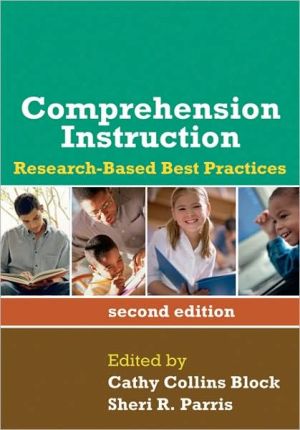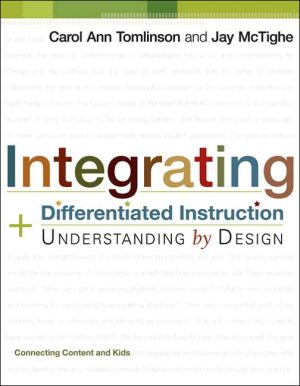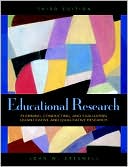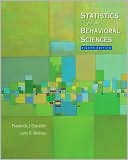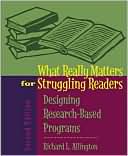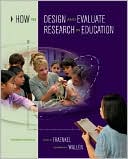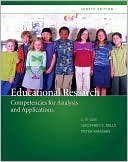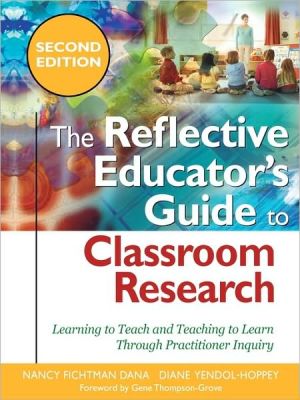Comprehension Instruction: Research-Based Best Practices
Now in a substantially revised and updated second edition, this comprehensive professional resource and text is based on cutting-edge research. In each chapter, leading scholars provide an overview of a particular aspect of comprehension, offer best-practice instructional guidelines and policy recommendations, present key research questions still to be answered, and conclude with stimulating questions for individual study or discussion. All 25 chapters are new, with coverage of such timely...
Search in google:
This comprehensive professional resource and text is based on cutting-edge research. In each chapter, leading scholars provide an overview of a particular aspect of comprehension, offer best-practice instructional guidelines and policy recommendations, present key research questions still to be answered, and conclude with stimulating questions for individual study or discussion. Coverage includes such timely topics as differentiated instruction, technology and reading comprehension, teaching English language learners, and the implications of current neuroscientific findings. Children's Literature This book starts by examining all of the existing theories and research about teaching reading in the classroom, including what works and what doesn't work. Then, several chapters examine how the brain can affect reading comprehension. Not until almost halfway through the book do the chapters begin to speak to teachers about how to apply this information in their own classroom. Here, the focus tends to be on the best way for students to comprehend certain types of text, but the chapters lack enough practical ways that a teacher can do this in his or her classroom. The primary strength of this book is that the editors try to explain the impact of research and practice on the future classroom. This enables educators to see both the implications of taking these theories and applying them in the classroom and the validity of teaching students to comprehend using new technology. This book would be an excellent textbook for a college course about teaching reading; however, for a practicing teacher, there is simply not enough usable information that can be applied directly in the classroom. Reviewer: Shelly Shaffer
Introduction Cathy Collins Block Block, Cathy Collins Sheri R. Parris Parris, Sheri R. 1I Theoretical Directions for the Future: What We Have Learned Since the National Reading Panel Report (2000)1 Beyond Borders: A Global Perspective on Reading Comprehension Sheri R. Parris Parris, Sheri R. Linda B. Gambrell Gambrell, Linda B. Andreas Schleicher Schleicher, Andreas 92 Research on Teaching Comprehension: Where We've Been and Where We're Going Cathy Collins Block Block, Cathy Collins Gerald G. Duffy Duffy, Gerald G. 193 Dual Coding Theory: Reading Comprehension and Beyond Mark Sadoski Sadoski, Mark 384 Cognitive Flexibility and Reading Comprehension: Relevance to the Future Kelly B. Cartwright Cartwright, Kelly B. 505 Metacognition in Comprehension Instruction: What We've Learned Since NRP Linda Baker Baker, Linda 656 Constructivist Theory and the Situation Model: Relevance to Future Assessment of Reading Comprehension Donna Caccamise Caccamise, Donna Lynn Snyder Snyder, Lynn Eileen Kintsch Kintsch, Eileen 80II Neuroscience: What Brain-Based Research Tells Us about Reading Comprehension7 Looking at Reading Comprehension through the Lens of Neuroscience Allan Paivio Paivio, Allan 1018 Using Neuroscience to Inform Reading Comprehension Instruction Cathy Collins Block Block, Cathy Collins Sheri R. Parris Parris, Sheri R. 1149 How Neuroscience Informs Our Teaching of Elementary Students Renate N. Caine Caine, Renate N. 12710 How Neuroscience Informs Our Teaching of Adolescent Students Sheri R. Parris Parris, Sheri R. 142III Improving Comprehension Instruction11 Transforming Classroom Instruction to Improve theComprehension of Fictional Texts Mary Helen Thompson Thompson, Mary Helen 15912 Explicit Instruction Can Help Primary Students Learn to Comprehend Expository Text Joanna P. Williams Williams, Joanna P. 17113 Explanation and Science Text: Overcoming the Comprehension Challenges in Nonfiction Text for Elementary Students Laura B. Smolkin Smolkin, Laura B. Erin M. McTigue McTigue, Erin M. Carol A. Donovan Donovan, Carol A. 18314 Learning to Think Well: Application of Argument Schema Theory to Literacy Instruction Alina Reznitskaya Reznitskaya, Alina Richard C. Anderson Anderson, Richard C. Ting Dong Ting, Dong Yuan Li Yuan, Li Il-Hee Kim Kim, Il-Hee So-Young Kim Kim, So-Young 19615 Improving Reading Comprehension through Writing Kathy Headley Headley, Kathy 21416 New Insights on Motivation in the Literacy Classroom Jacquelynn A. Malloy Malloy, Jacquelynn A. Linda B. Gambrell Gambrell, Linda B. 226IV Differentiated Comprehension Instruction17 Comprehension Instruction in Action: The Elementary Classroom Nell K. Duke Duke, Nell K. Nicole M. Martin Martin, Nicole M. 24118 Comprehension Instruction in Action: The Secondary Classroom Douglas Fisher Fisher, Douglas Nancy Frey Frey, Nancy 25819 Comprehension Instruction in Action: The At-Risk Student Michael F. Hock Hock, Michael F. Irma E. Brasseur Brasseur, Irma E. Donald D. Deshler Deshler, Donald D. 27120 Comprehension Instruction for English Learners Robert Rueda Rueda, Robert Alejandra Velasco Velasco, Alejandra Hyo Jin Lim Lim, Hyo Jin 294V Technology and Comprehension Instruction: New Directions21 Games and Comprehension: The Importance of Specialist Language James Paul Gee Gee, James Paul 30922 Research on Instruction and Assessment in the New Literacies: of Online Reading Comprehension Donald J. Leu Leu, Donald J. Julie Coiro Coiro, Julie Jill Castek Castek, Jill Douglas K. Hartman Hartman, Douglas K. Laurie A. Henry Henry, Laurie A. David Reinking Reinking, David 32123 Scaffolding Digital Comprehension Bridget Dalton Dalton, Bridget David Rose Rose, David 34724 Technologically Based Teacher Resources for Designing Comprehension Lessons Jan Lacina Lacina, Jan 362VI Conclusion25 Summing Up Sheri R. Parris Parris, Sheri R. Cathy Collins Block Block, Cathy Collins 381Epilogue: What the Future of Reading Research Could Be Michael Pressley Pressley, Michael 391Author Index 415Subject Index 431
\ Children's Literature\ - Shelly Shaffer\ This book starts by examining all of the existing theories and research about teaching reading in the classroom, including what works and what doesn't work. Then, several chapters examine how the brain can affect reading comprehension. Not until almost halfway through the book do the chapters begin to speak to teachers about how to apply this information in their own classroom. Here, the focus tends to be on the best way for students to comprehend certain types of text, but the chapters lack enough practical ways that a teacher can do this in his or her classroom. The primary strength of this book is that the editors try to explain the impact of research and practice on the future classroom. This enables educators to see both the implications of taking these theories and applying them in the classroom and the validity of teaching students to comprehend using new technology. This book would be an excellent textbook for a college course about teaching reading; however, for a practicing teacher, there is simply not enough usable information that can be applied directly in the classroom. Reviewer: Shelly Shaffer\ \ \ \ \ From the Publisher"From theory to classroom practice, this well-organized and highly usable text represents an integrative view of the nature of reading comprehension. The text will provide graduate students with comprehensive foundational knowledge and will stimulate researchers in the field to consider new ways to investigate reading comprehension and classroom instruction. Block, Parris, and their colleagues have developed a book that offers information and support for teachers of young, adolescent, and struggling learners, as well as English language learners."--Pamela J. Dunston, PhD, School of Education, Clemson University\ "This volume, a most worthy follow-up to the first edition, gets to the heart of how we comprehend text and how to best foster the development of comprehension in students. The array of topics and the quality of the chapters contribute breadth and depth to the ongoing evolution of knowledge in this critical area. This book is well situated at the convergence of theory and practice and, as such, I recommend it for graduate courses for teachers and researchers."--Peter Afflerbach, PhD, Department of Curriculum and Instruction, University of Maryland\ "This is a book that needs to be read by all educators! This second edition examines groundbreaking research that is becoming more important in education today, such as the brain processes involved in the ability to comprehend text. This book is an invaluable resource for teachers of all grade levels who are serious about reading and comprehension."--John Scovill, Jr., third-grade teacher, Washington County School District, St. George, Utah\ \ \
